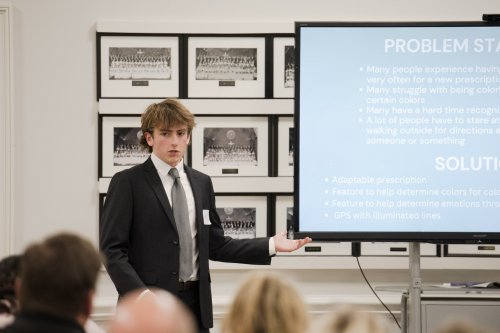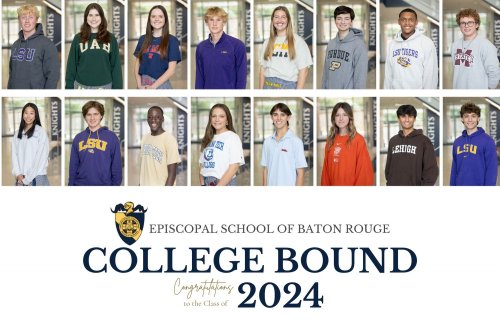- Discover Episcopal
- Admission
- Our Program
- Athletics
- Arts
- Spirituality
- Student Life
- Support Episcopal
- Alumni
- Parent Support
- Knightly News
- Contact Us
- Calendar
- School Store
- Lunch Menu
- Summer Camps
« Back
A Scientific Approach to Studying
October 15th, 2021
“Your life as a teacher begins the day you realize that you are always a learner.” Robert John Meehan, teacher/poet
 Most teachers are lifelong learners who relish the opportunity to delve deeper into topics and make discoveries. A recent book study among the history faculty illustrates the excitement that teachers still feel when they learn something new. After years in the classroom, Episcopal teachers, like Middle School teacher Virginia Day ’08, still enjoy sharing new concepts.
Most teachers are lifelong learners who relish the opportunity to delve deeper into topics and make discoveries. A recent book study among the history faculty illustrates the excitement that teachers still feel when they learn something new. After years in the classroom, Episcopal teachers, like Middle School teacher Virginia Day ’08, still enjoy sharing new concepts.
“It blew my mind a little bit,” says Day with a smile and a laugh. Day and her department colleagues examined the concepts presented in the book, “Understanding How We Learn: A Visual Guide” by Dr. Yana Weinstein and Dr. Megan Sumeracki, who refer to themselves as the Learning Scientists. The researchers are cognitive psychological scientists who investigate the science of learning, and it is their discoveries that blew Day’s mind. The scientists propose that the learning styles concept that we all know, learning through processes like visual or verbal cues, isn’t actually real. “It changed how I approach teaching and how I present skills,” says Day, who once considered herself a visual learner but has since had to rethink that assumption. The discovery impacts how Day delivers information to the newest members of Episcopal’s Middle School.
Putting the Science into Practice
Each year, Day begins sixth grade lessons “purposely teaching students skills to study.” After the book study, she is even more intentional. Day uses concepts including dual coding, retrieval practice, spaced practice and concrete examples to help students retain information. Dual coding means the teacher introduces concepts using words and pictures. By connecting the pictures to the words, students are more likely to remember the concepts. Pop into Day’s classroom, and you’ll find that her whiteboard is filled with terms and corresponding drawings. “The picture is the hook,” she points out regarding each hand-drawn image.
Day also implements the learning scientists’ concepts of retrieval practice, spaced practice and concrete examples to help students retain information. Students explain concepts in their own words using concrete examples, which the researchers say helps with retention. “Re-reading notes is the least effective way to study,” says Day. She offers the following thoughts on how to incorporate concrete examples instead:
- Focus on understanding and elaborating on the concepts
- Be able to write or say the information in your own words without looking at class materials
Day also asks students to complete assignments over the course of a few days rather than all at once. That spaced practice ensures daily reinforcement of the lesson rather than cramming information all at once. “Two hours of studying all at once is not nearly as good as two hours of studying spread out over two weeks,” she says. “Our brains need rest and time to process and encode information.”
Day uses dual coding, retrieval practice, spaced practice and concrete examples to help students retain information.
Day is implementing techniques learned in "Understanding How We Learn: A Visual Guide" by Dr. Yana Weinstein and Dr. Megan Sumeracki.
Boosting Critical Thinking Skills
Day says incorporating the psychological strategies into the lesson is getting results, quickly. “They’re not getting the questions wrong anymore,” she says in reference to commonly missed questions among students. She says the students are also eager to share their ideas, and the experience has been enjoyable for everyone.
It’s obvious that Day is excited to keep learning, and she appreciates the science behind what the cognitive scientists are doing. Why would the concepts of studying be relevant in a social studies classroom? “You can’t think of things in isolation,” says Day. She points out that social studies as a subject is so much more than history and the learning of historic dates and milestones. She says social studies encompasses psychology, government/civics, geography, history, economics and sociology. “We’re not making kids learn facts and dates, we’re helping them learn why things happened,” she says. She says the dates simply provide the context for a greater understanding.
Episcopal alumni often credit the school with helping them think critically, which can be difficult to illustrate to potential families or those outside of the community. A lesson on studying, inspired by the science of learning, and offered by a veteran social studies teacher who is still enthusiastic about learning, is a great way to tell that story. We are glad to have teachers with a passion for helping students develop, and we’re glad to know that they are still learning every day.
What can families do?
There are easy steps families can take together to improve study time and boost information retention. Day offers the following thoughts.
Put learning and understanding over making good grades
“We focus on kids making good grades and the way we go about that is to memorize material,” says Day. “If your focus shifts to learning concepts and skills, good grades will follow.” Day suggestions that families do the following:
- Instead of saying, “You need to know this information,” try saying, “What was the most interesting thing you’ve learned about this topic?” and then elaborate on it with as many details as possible.
- The words we use matter. Shift the language to focus on learning rather than what you “need to know for the test.”
Study spaces should be quiet and free of electronics like phones, TVs and music
“Focus and attention are key to learning,” says Day. “Science shows that we are really bad at multitasking, even when we think we can do it. The interesting thing here is that we almost always overestimate our ability to multitask. We think we can do it effectively, but science says the opposite.”
- Listening to music, texting, gaming and watching TV divides our attention and makes us worse at both things.
- If you want the biggest “bang for your buck” when it comes to studying and homework, your environment needs to allow you to focus your attention fully on the material.
 Episcopal launched a two year partnership with Paper to provide Middle and Upper School students access to on-demand, unlimited online academic support. Families can learn more about the benefits here. To access the platform, click here.
Episcopal launched a two year partnership with Paper to provide Middle and Upper School students access to on-demand, unlimited online academic support. Families can learn more about the benefits here. To access the platform, click here.
The Episcopal School of Baton Rouge 2024-2025 application is now available! For more information on the application process, to schedule a tour, or learn more about the private school, contact us at [email protected] or 225-755-2685.
Posted in the categories All, Middle School.
Other articles to consider
 May16Episcopal Welcomes Father Patrick Edwards as New Head Chaplain
May16Episcopal Welcomes Father Patrick Edwards as New Head ChaplainLearn more about new Episcopal Head Chaplain Father Patrick Edwards.
See Details May16Lower School Happenings - May 2024
May16Lower School Happenings - May 2024There's excitement and joy in Lower School as students wrap up the school year. Check out the latest projects.
See Details May16Future Business Leaders Benefit from Spring Lessons/Community Support
May16Future Business Leaders Benefit from Spring Lessons/Community SupportEpiscopal students participated in two real-world learning experiences – the What’s Your Bright Idea? Episcopal Pitch Contest and the annual Burkenroad Reports Investment Conference.
See Details May8College Announcements 5.10.24
May8College Announcements 5.10.24Please join us in congratulating members of the Class of 2024 as they announce their college enrollment decisions.
See Details
Categories
- All
- Admission
- Athletics
- College Bound 2019
- College Bound 2020
- College Bound 2021
- College Bound 2022
- College Bound 2023
- College Bound 2024
- Counselors Corner
- Episcopal Alumni
- Giving
- Head Of School
- Lower School
- Middle School
- Spirituality And Service
- Student Work
- The Teachers' Lounge
- Upper School
- Visual And Performing Arts
Recent Articles
- 05/16/24Episcopal Welcomes Father Patrick Edwards as New Head Chaplain
- 05/16/24Lower School Happenings - May 2024
- 05/16/24Future Business Leaders Benefit from Spring Lessons/Community Support
- 05/8/24College Announcements 5.10.24
- 05/7/24Episcopal's Addisyn Botos Will Continue Track & Field at Southern Miss
- 05/7/24Spring Sports Success!
- 05/3/24Episcopal Audiences Wowed by "The Children of Willesden Lane"
- 05/3/24Service Learning & Community Impact Students Share Thoughts on Earth Day
- 05/2/242024 Mums of Alums Luncheon Draws Large Crowd of Supportive Mums
- 05/2/24College Announcements 5.3.24














